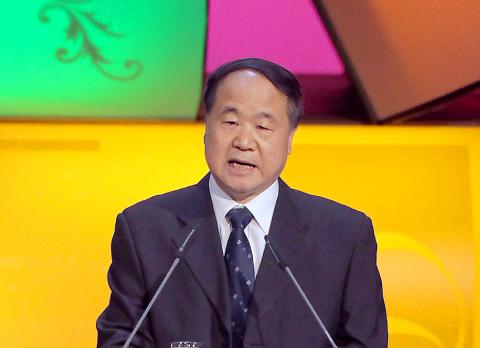Chinese writer Mo Yan (莫言) won the Nobel Prize in Literature yesterday, a cause of pride for a government that had disowned the only previous Chinese winner of the award, an exiled critic.
National TV broke into its newscast to announce the award — exceptional for the tightly scripted broadcast that usually focuses on the doings of Chinese leaders.
The Swedish Academy, which selects the winners of the prestigious award, praised Mo’s “hallucinatory realism” saying it “merges folk tales, history and the contemporary.”

Photo: EPA
Peter Englund, the academy’s permanent secretary, said the academy had contacted Mo, 57, before the announcement.
“He said he was overjoyed and scared,” Englund said.
State media quoted Mo as saying the win has inspired him to “strive harder” in his writing.
“On hearing the news that I won the award, I was very happy,” Mo was quoted saying by the official China News Service.
“I will focus on creating new works. I will strive harder to thank everyone,” he said.
Among the works highlighted by the Nobel judges were Red Sorghum (1993), The Garlic Ballads (1995) and Big Breasts & Wide Hips (2004).
"He’s written 11 novels and let’s say a hundred short stories,” Englund said. “If you want to start off to get a sense of how he is writing and also get a sense of the moral core in what he is writing I would recommend The Garlic Ballads.”
The award was almost certain to be welcomed in China, unlike when jailed dissident Liu Xiaobo (劉曉波) won the Nobel Peace Prize in 2010. Beijing also disowned the Nobel when Gao Xingjian (高行健) won the literature award in 2000 for his absurdist dramas and inventive fiction. Gao’s works are laced with criticisms of China’s communist government and have been banned in China.
Chinese social media exploded with pride after the announcement. Hu Xijin (胡錫進), editor-in-chief of the state-run Global Times tabloid, said on a microblog that Mo’s winning is proof that the West has looked beyond Chinese dissidents.
“This prize may prove China, with its growing strength, does not have only dissidents who can be accepted by the West. China’s mainstream cannot be kept out for long,” Hu wrote.
Born Guan Moye (管謨業) in 1955 to a farming family in Shandong Province, Mo chose his penname while writing his first novel. Garrulous by nature, Mo has said the name, meaning “don’t speak,” was intended to remind him to hold his tongue lest he get himself into trouble and to mask his identity since he began writing while serving in the army.
His breakthrough came with novel Red Sorghum published in 1987. Set in a small village, like much of his fiction, Red Sorghum is an earthy tale of love and peasant struggles set against the backdrop of the anti-Japanese war.
Additional reporting by AFP

US PUBLICATION: The results indicated a change in attitude after a 2023 survey showed 55 percent supported full-scale war to achieve unification, the report said More than half of Chinese were against the use of force to unify with Taiwan under any circumstances, a survey conducted by the Atlanta, Georgia-based Carter Center and Emory University found. The survey results, which were released on Wednesday in a report titled “Sovereignty, Security, & US-China Relations: Chinese Public Opinion,” showed that 55.1 percent of respondents agreed or somewhat agreed that “the Taiwan problem should not be resolved using force under any circumstances,” while 24.5 percent “strongly” or “somewhat” disagreed with the statement. The results indicated a change in attitude after a survey published in “Assessing Public Support for (Non)Peaceful Unification

The CIA has a message for Chinese government officials worried about their place in Chinese President Xi Jinping’s (習近平) government: Come work with us. The agency released two Mandarin-language videos on social media on Thursday inviting disgruntled officials to contact the CIA. The recruitment videos posted on YouTube and X racked up more than 5 million views combined in their first day. The outreach comes as CIA Director John Ratcliffe has vowed to boost the agency’s use of intelligence from human sources and its focus on China, which has recently targeted US officials with its own espionage operations. The videos are “aimed at

‘MISGUIDED EDICT’: Two US representatives warned that Somalia’s passport move could result in severe retaliatory consequences and urged it to reverse its decision Minister of Foreign Affairs Lin Chia-lung (林佳龍) has ordered that a special project be launched to counter China’s “legal warfare” distorting UN Resolution 2758, a foreign affairs official said yesterday. Somalia’s Civil Aviation Authority on Wednesday cited UN Resolution 2758 and Mogadishu’s compliance with the “one China” principle as it banned people from entering or transiting in the African nation using Taiwanese passports or other Taiwanese travel documents. The International Air Transport Association’s system shows that Taiwanese passport holders cannot enter Somalia or transit there. The Ministry of Foreign Affairs (MOFA) protested the move and warned Taiwanese against traveling to Somalia or Somaliland

Four former Hong Kong opposition lawmakers jailed in the territory’s largest national security case were released yesterday after more than four years in prison, the first among dozens convicted last year to regain their freedom. Former legislators Claudia Mo (毛孟靜), Jeremy Tam (譚文豪), Kwok Ka-ki (郭家麒) and Gary Fan (范國威) were part of a group of 47 public figures — including some of Hong Kong’s best-known democracy advocates — who were charged with subversion in 2021 for holding an informal primary election. The case fell under a National Security Law imposed on the territory by Beijng, and drew international condemnation and warnings